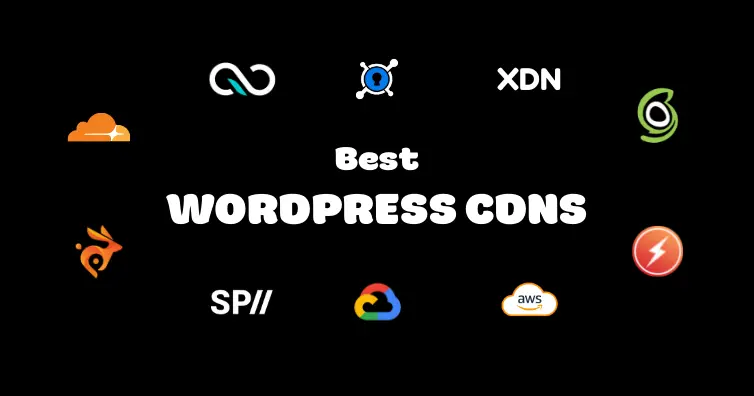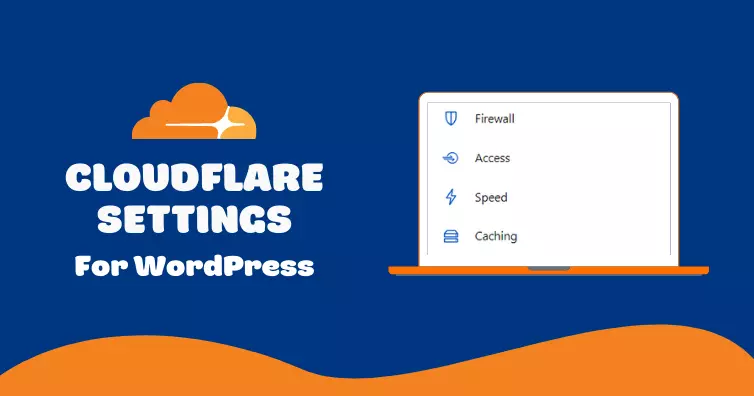
RocketCDN is one of the worst CDNs.
It basically serves files from StackPath’s CDN and that’s it. No full page caching, HTTP/3, Brotli, firewall, or features most CDNs come with. It was also removed from cdnperf.com. At the end of the day, RocketCDN was designed to be easy. Activate it in 1-click then pay WP Rocket $7.99/mo.
WP Rocket doesn’t provide documented APO compatibility because they know it’s a superior product. For $5/month, you get Cloudflare’s nearly 4x larger network, 2x Tbps speeds, and full page caching. And if you want something even faster, look at Rocket.net’s Cloudflare Enterprise.
I’m not a fan of WP Rocket, RocketCDN, or Imagify since between the 3, they do a poor job optimizing LCP/TTFB/images/mobile. But that’s a different story. For now, avoid RocketCDN.
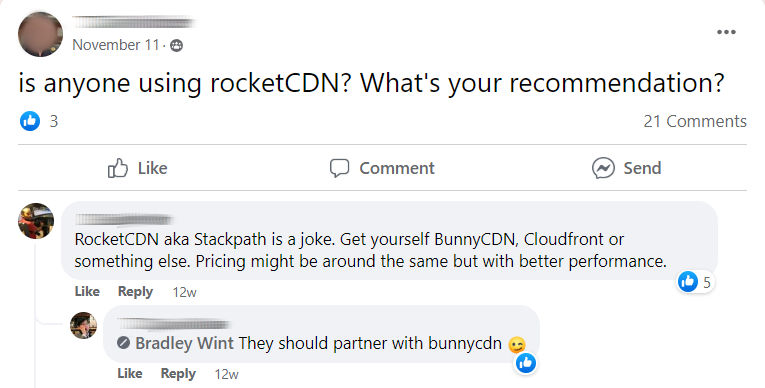
1. RocketCDN vs. Other CDNs
RocketCDN, BunnyCDN, and Cloudways’ Cloudflare Enterprise don’t have full page caching which is already a huge disadvantage since it’s one of the main ways to improve global TTFB. And on a side note, while RocketCDN claims to have load balancing, I emailed their support who denied this and said “RocketCDN just serves your static assets the closer it can from your users.” Nice, conflicting information about load balancing, unlimited bandwidth, who knows what else.
QUIC.cloud’s CDN was built specifically to work on LiteSpeed servers and includes full page caching, 80+ PoPs, and is also needed for image/page optimizations to work with LiteSpeed Cache. If you’re on a LiteSpeed server, you should be using QUIC.cloud’s CDN, ideally their paid/standard plan which unlike the free plan, uses all 80+ PoPs and includes DDoS protection.
However, Cloudflare has the largest network by far with data transfer speeds of 192+ Tbps, along with many speed/security features. For $5/month, you really can’t beat Cloudflare APO. But if you’re willing to pay $10/mo for FlyingProxy or switch hosts to Rocket.net, Cloudflare Enterprise is arguably the fastest CDN for WordPress (and what I use) with powerful routing features like prioritized routing, Argo Smart Routing, and Mirage/Polish for image optimization. And unlike RocketCDN, you don’t need an image optimization and security plugin when using it.
| RocketCDN | FlyingCDN By FlyingPress | Cloudflare + APO | FlyingProxy Cloudflare Enterprise | Cloudways Cloudflare Enterprise | Rocket.net Cloudflare Enterprise | |
|---|---|---|---|---|---|---|
| CDN | StackPath | BunnyCDN | Cloudflare | Cloudflare | Cloudflare | Cloudflare |
| Speed (Tbps) | 100 | 80 | 192 | 192 | 192 | 192 |
| Locations | 73 | 114 | 285 | 285 | 285 | 285 |
| Full page cache | x | Only geo-replication | ✓ | APO | x | APO |
| HTTP/3 | x | x | ✓ | ✓ | ✓ | ✓ |
| Brotli | x | ✓ | ✓ | ✓ | ✓ | ✓ |
| Priority routing | x | x | Paid | ✓ | ✓ | ✓ |
| Argo | x | x | Paid | x | ✓ | ✓ |
| Load balancing | x | ✓ | Paid | ✓ | ✓ | ✓ |
| WAF | x | x | ✓ | ✓ | ✓ | ✓ |
| Anti-DDoS | x | x | ✓ | ✓ | ✓ | ✓ |
| Image optimization | x | Bunny Optimizer | Paid | Mirage/Polish | Mirage/Polish | Mirage/Polish |
| Compression | x | ✓ | Paid | ✓ | ✓ | ✓ |
| WebP | x | x | Paid | ✓ | ✓ | ✓ |
| Mobile resizing | x | x | Paid | ✓ | ✓ | ✓ |
| Bandwidth | Not unlimited as advertised | Unlimited | Unlimited | 100GB | 100GB | Determined by hosting plan |
| Price | $8.99/mo | $.03/GB | $5/mo | $10/mo | $5/mo | Free w/ hosting |
2. Uses StackPath
RocketCDN uses StackPath which has has 73 edge locations and a 100+ Tbps speed. Compare this to Cloudflare’s 285+ locations and 192 Tbps, StackPath is significantly smaller and slower.

StackPath was also removed from cdnperf.com (if you check, they’re not there anymore)
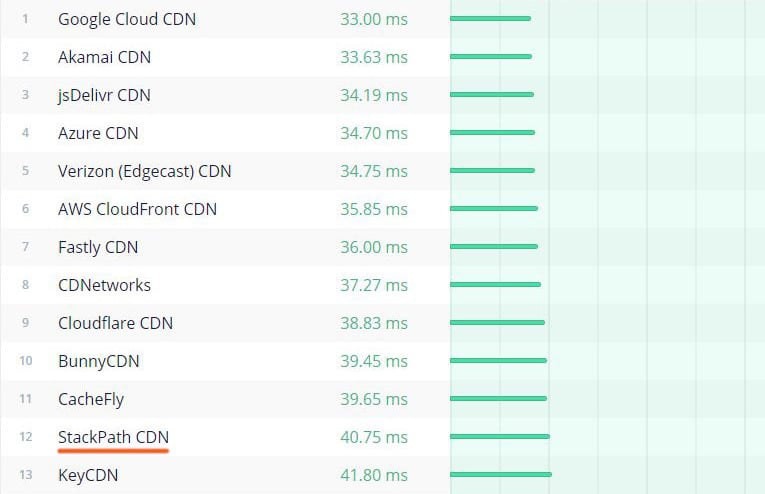
3. No Full Page Caching
Full page caching improves TTFB in multiple global locations by caching HTML. Cloudflare APO, QUIC, and SiteGround CDN support full page caching and is especially helpful for dynamic sites.
How WP Rocket tells you to measure CDN performance makes no sense. The whole point of a CDN is to improve speed in multiple locations, so why use GTmetrix which only tests 1 location?
SpeedVitals and KeyCDN are better tools which test TTFB in 10-40 locations. SpeedVitals recommends testing your site a few times to make sure resources are cached and served from the CDN’s closest data center. The further away the server is to the testing location, the slower your TTFB will be. Full page caching improves this, and even more so with other CDN features.
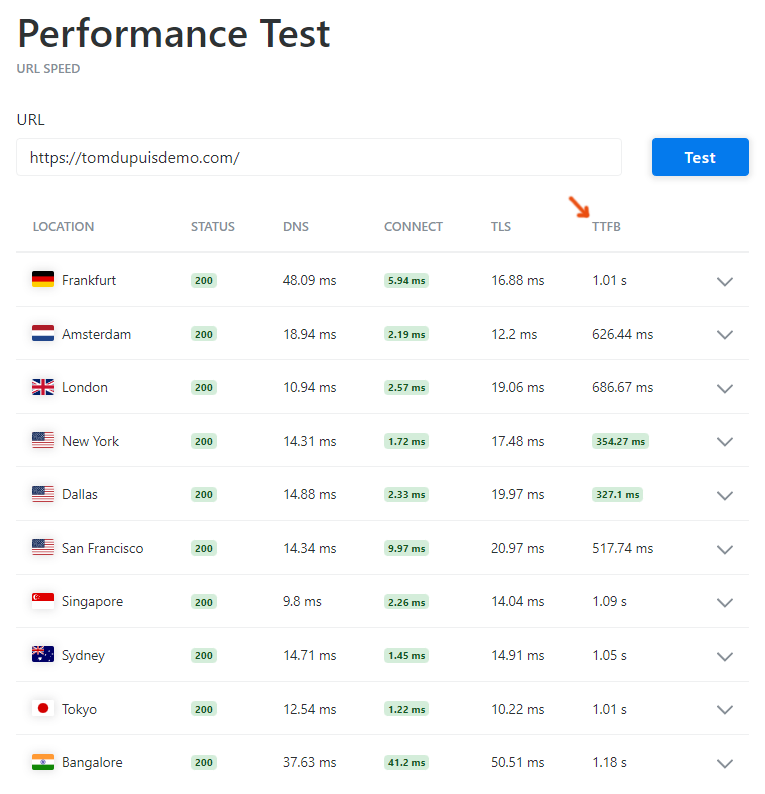
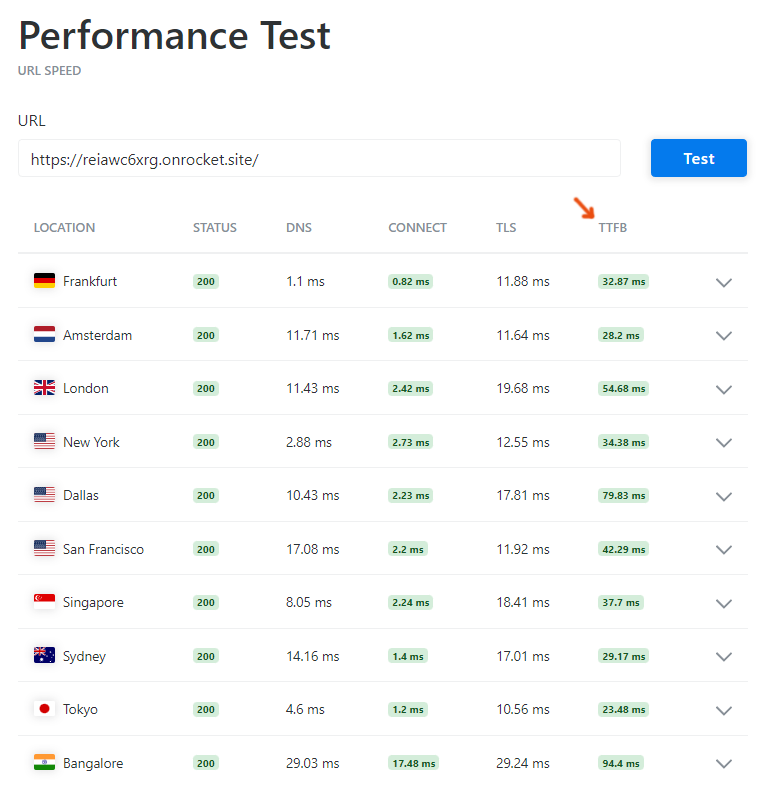
4. No Image Optimizations
Cloudflare Mirage + Polish and Bunny Optimizer are paid add-ons, but there are quite a few benefits to using them, including not having to use an image optimization plugin on your site.
- They don’t take up storage since they optimize images “on the fly.”
- They’re not taxing on your server (unlike image optimization plugins).
- They support mobile image resizing instead of having to use adaptive images.
- Cloudflare intelligently optimizes viewport images (and images on slow connections).
RocketCDN does none of these, and their Imagify plugin is one of the worst plugins for image optimization. Even if you used them both, the features still don’t come close to other solutions:
| Imagify | ShortPixel | Optimole | RocketCDN | Bunny Optimizer | Cloudflare Mirage/Polish | |
|---|---|---|---|---|---|---|
| Compression | ✓ | ✓ | ✓ | x | ✓ | ✓ |
| WebP | ✓ | ✓ | ✓ | x | ✓ | ✓ |
| Mobile resizing | x | Requires ShortPixel Adaptive Images | ✓ | x | ✓ | ✓ |
| Viewport optimizations | x | x | ✓ | x | x | ✓ |
| Network optimizations | x | x | ✓ | x | x | ✓ |
| AVIF conversion | x | ✓ | ✓ | x | x | ✓ |
| AVIF support | x | ✓ | ✓ | x | x | ✓ |
| Serve images from CDN | x | Requires ShortPixel Adaptive Images | Cloudfront | StackPath | ✓ | ✓ |
| No server usage | x | x | x | N/A | ✓ | ✓ |
| No bloat | x | x | Offload to cloud | N/A | ✓ | ✓ |
| Price | Free 20MB/mo then $9.99/mo | Free 100 credits/mo then $3.99/mo | Free 5,000 visits/mo then $19.08/mo | $8.99/mo | $9.5/mo or $.03/GB w/ FlyingCDN | Included w/ Cloudflare Enterprises |
6. No Vanity URL
Most CDNs that use a CDN URL let you change it (called a vanity URL). So instead of using the default URL (example.wp.rocket.me), you would change it to something like cdn.example.com.
7. Bandwidth Is NOT Unlimited
RocketCDN’s advertising “unlimited bandwidth” is a lie.
Hidden in their docs, it says “we reserve the right to disable your RocketCDN Url if we detect bandwidth overuse.” How much bandwidth do they allow? Nobody knows because they don’t tell you. But one thing is for sure – lots of people complain about being cut off at a certain point.
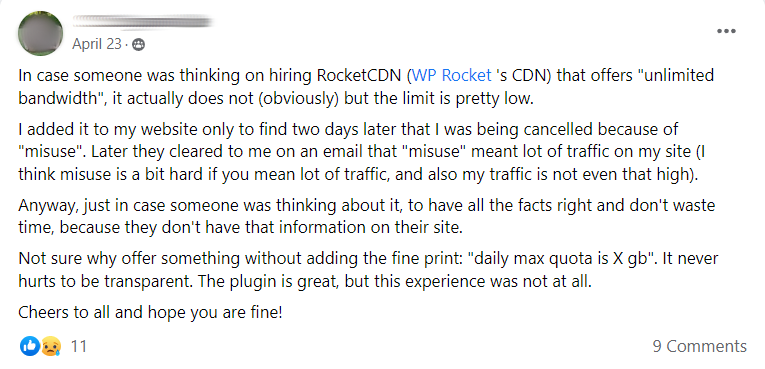
8. Verdict: Use Cloudflare APO Or QUIC (On LiteSpeed) Instead
RocketCDN is awful and I didn’t even bother signing up for the affiliate program since telling people to use it would be wrong. Just because it’s sitting in front of you in your cache plugin settings doesn’t mean you should use it. Stick with one of the other (more performant) CDNs.

It’s meant to be easy, not performant.
This is my biggest gripe about both RocketCDN and WP Rocket. They sacrifice performance to make things easy, but you lose out on speed/security features. This is also the case with WP Rocket since they’ve only released 1 new feature after 2020 if you check their changelog. Their products are inferior and I definitely recommend looking into FlyingPress or LiteSpeed Cache.
| WP Rocket | FlyingPress | LSC | |
|---|---|---|---|
| Server-side caching | x | x | ✓ |
| Remove unused CSS | Inline | Separate file | Separate file |
| Critical CSS | ✓ | ✓ | ✓ |
| Host fonts locally | x | ✓ | ✓ |
| Preload images | x | ✓ | x |
| Fetchpriority resource hint | x | ✓ | x |
| Lazy render HTML elements | x | ✓ | ✓ |
| Lazy load background images | Inline | Helper class | Helper class |
| Exclude images from lazy load | By URL | By number | By URL |
| Self-host YouTube placeholder | x | ✓ | x |
| Add missing image dimensions | ✓ | ✓ | ✓ |
| Scheduled database cleanups | ✓ | ✓ | ✓ |
| Control preloading | x | x | ✓ |
| Advanced cache control | x | x | ✓ |
| ESI (edge side includes) | x | x | ✓ |
| Gravatar cache | x | x | ✓ |
| Limit post revisions | x | x | ✓ |
| Price | $49/year | $42/year | Free |
| Tutorial | View tutorial | View tutorial | View tutorial |
Cheers,
Tom

